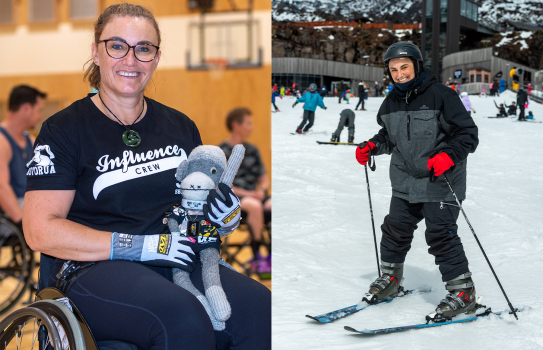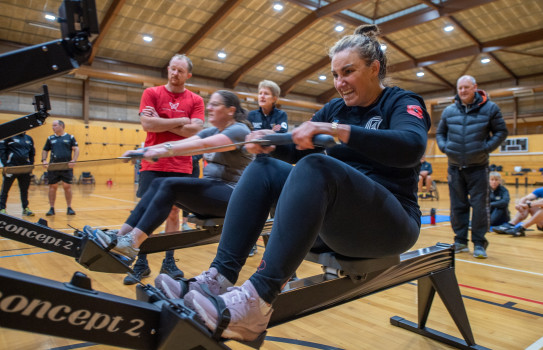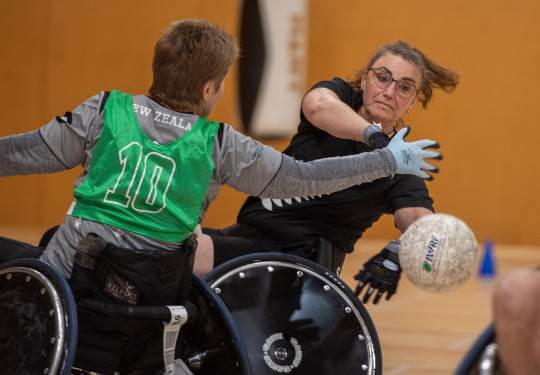Crash and bash of Invictus Games helps NZ soldier’s recovery from trauma
New Zealand Army Staff Sergeant (SSGT) Tina Grant, DSD, makes a difference in the lives of Army personnel everyday through her work with the Families of our Fallen.
17 December, 2024
In 2011, her husband New Zealand Special Forces soldier Corporal Douglas Grant was killed in action in Afghanistan. The following year, SSGT Grant took up a new role as primary contact for all Army families who have lost relatives while serving in the New Zealand Defence Force.
In late 2019, SSGT Grant faced another hurdle which would result in depression and the loss of her memories and independence – a brain tumour.
She was heading overseas for a conference when she was hit by extreme headaches.
“I ate Panadol like they were lollies and just survived. It was excruciatingly painful, it felt like I had a volcano going off in my head very five seconds,” she said.
Back in New Zealand she was diagnosed with the brain tumour and required surgery.
“I thought things have happened to other people that are way worse, I have lived through way worse, like losing Douglas. I put it on that scale, and as long as they got rid of the headaches then it would be alright,” she said.
Thankfully the 10cmx10cm tumour was benign but a few days after the surgery she had a grand mal seizure and doctors thought she may have a brain bleed.
While they found no brain bleed they did discover another tumour, a 5cmx5cm one in her uterus, and an appendix rupture.
“I was nine months down the track with my brain tumour, struggling with fitness, sleeping, and depression. I was on sick leave for 12 months at home and I couldn’t go anywhere. During that timeframe we had two Covid-19 lockdowns – it was driving me insane, I hated it.”
SSGT Grant said the depression proved to be the worst aspect of her medical problems.
You can fix the brain, you can whip out the tumour and you can release the pressure and the pain. But the depression was the worst as I spiralled down big time and lost all purpose.
“I couldn’t do anything by myself. I couldn’t walk to the letterbox, I couldn’t shower myself – it affected my balance and my mobility. I couldn’t watch TV, read a book or walk around, I literally couldn’t do anything.
“Because I couldn’t drive I had to be driven around and that also made me nauseous.”
SSGT Grant said she had always been independent and done everything herself, so not being able to do this now was by far the worst part of her recovery.
“For me I felt like I had lost my purpose, I felt like I had no reason to be here and it made me think about what I was doing, why was I here, and that maybe nobody needed me because they were getting on with their lives and I was just sitting there doing nothing.
“Eventually I got myself some psych support to help me mentally get though that part. I am un-ashamedly still on antidepressants. It works for me. I am staying on them because I am not going back there to that dark place again,” she said.
While SSGT Grant is a long way into her recovery, her memory is still affected.
“I am so much better with my recall of daily events. But, I still don’t have long-term memories today, I don’t remember a lot of the children when they were little. People will tell me stories and I will have no clue.”

SSGT Grant will compete in the New Zealand Team at the Invictus Games in Whistler and Vancouver, Canada in February 2025 after her partner Lyall encouraged her to apply.
She is no stranger to the Games, having supported as staff at the inaugural Games in London 2014 and then again in Orlando 2016.
She didn’t realise how much she needed this journey for herself.
“When I first went to Invictus the people were truly amazing. I compared myself to those people but I didn’t think I deserved to be a competitor.
“To me my brain tumour wasn’t a big deal compared to those who have lost three limbs. They were physical injuries I saw and felt like mine was invisible.”
SSGT Grant will compete in alpine skiing, wheelchair curling, indoor rowing, skeleton, seated volleyball and wheelchair rugby at the Games. She is most excited about wheelchair rugby.
“I have found something that I enjoy, that I can do, and I absolutely love it. I have gone away on two tournaments already and I have absolutely loved it, and I have enjoyed going to training every week.
“I have been training all year. I am so lucky that I am able bodied, but it is putting me out of my comfort zone. Normally when you play netball you can step forward and throw, you can’t do that in a chair, you just have to learn to throw and it is different muscles you are using different actions, and it is rough.
“I love the crash and bash. I do not want to be on the sidelines, I want to play in every game in Canada,” she said.
I want to meet and greet others, I want to see people succeed. I am definitely not the fittest person in the team, but I am going to do the best I can do for the team and myself. I love being part of a team, and I love the camaraderie.
SSGT Grant said that she believed the Games gives people who have been injured, wounded or ill the ability to be around likeminded people, and share their journeys.
“For some I think it lets them get their competitive edge back so they can feel they are on the right track to recovery and giving them self-worth again after their life changing event.
“The thing I have learnt is that out of every bad scenario comes a good one, you just have to flip it and be in the right mind state to enable that. Life is so short and precious so you need to enjoy what each day brings.”

SSGT Grant said being part of the team had taken her outside her comfort zone, and she could now celebrate how far she had come.
“I know that I am a hell of a lot better than I was four years ago. Mentally and physically and my life in general.
“Things have changed. I used to get up and go to work because it was my job, now I go to work to help people, move them along in their journey. I give them a hand up, not a hand out - to help get them through their struggles in life. I know what it is like,” she said.
She said she loved that she could help people and change their lives on a daily basis.
“When there is nowhere for someone to go, they come to me and I help guide them in the right direction.
“I have been in the military a long time and I am lucky that everybody knows me. I don’t necessarily know all of them but people will reach out to me and say this has happened or I they know someone who this has happened to and how can I help.
“I help people get through difficult times in their lives, which is what I do with my job, I support people going through the grieving journey,” she said.
Still wanting more?
Head to our Invictus Games webpage(external link)
